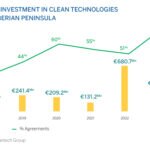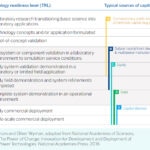The Iberian Peninsula is on the cutting edge of Europe’s cleantech revolution. It is believed that the industry will create some 2.65 million new jobs and mobilize €150 billion in investment across the region by 2030. These impressive figures are revealed in a new report headed up by BBVA and Cleantech for Iberia, a coalition set up to drive the potential of Spain and Portugal as a clean energy hub in the European Union.

The region has become a benchmark in these technologies, with Spain on track to reach 81% renewable energy generation by 2030 and Portugal close to exceeding 80% by 2026, according to the report. “With a strong industrial base, a fast-growing cleantech innovation ecosystem and already a clean energy powerhouse, the Iberian Peninsula is poised to become the next cleantech industry leader in Europe,” comments Javier Rodriguez Soler, Global Head of Sustainability and CIB at BBVA. “Sustainability is a tale of innovation and it is very important for us to identify and support the cleantech ecosystem, which will be absolutely essential in the decarbonization of the economy,” he explained.
The analysis explores the opportunities and challenges facing the financing and scalability of cleantech projects across the region, underlining the need for strategic action by government and industry players. “Our main goal with this publication goal is to illuminate the path towards a robust and well-funded clean technology ecosystem capable of driving the Iberian Peninsula’s transition toward a low-carbon economy. Through this comprehensive analysis and targeted solutions, we want to help policy makers, industry leaders and financial institutions foster an enabling environment for cleantech scalability,” remarks Bianca Dragomir, Executive Director of Cleantech for Iberia. “The Iberian Peninsula is in a privileged position to lead the transition toward a low-carbon economy. However, funding this transition and implementing strategic policies will be the main challenges when it comes to fully unlocking Iberia’s potential and ensuring a sustainable future,” says Dragomir.

The report "Cleantech Bankability in the Iberian Peninsula" flags several key technologies that can contribute significantly to the decarbonization of Spain and Portugal. These include energy storage (including lithium-ion and long-duration energy storage, or LDES); innovative technologies to improve electricity grids including high voltage direct current (HVDC); the production, storage and transport of hydrogen and renewable fuels of non-biological origin (RFNBO); recycling and circularity (including the production of biogas, biomethane and biofertilizers); and carbon capture, utilization and storage (CCUS).
Despite the Spanish cleantech sector’s enormous potential and the ambitious goals the government has set, the report recognizes that new technologies and decarbonization projects developed in the Iberian Peninsula face significant barriers to financing, especially in the early and growth stages. The year 2023 witnessed a significant decline in investments and Spanish startups received 70% less investment than their French and German counterparts. Among the main challenges to be overcome, the report points to high capital requirements, payback periods, technology risks and market conditions.

To overcome these funding issues, the study points to the need for coordinated action between government and industry. It calls on governments and industry to develop stable and predictable regulatory frameworks, national laws to stimulate investment, and the use of Emissions Trading System (ETS) revenues to incentivize cleantech investments, among other measures. More precisely, the report states that the funds that EU member states will receive over the next 12 years will quadruple and that governments should look to invest 25% of these revenues to promote clean technologies, a mechanism that would allow them to broaden the impact and benefits of cleantech over the course of this decade.
Additionally, the white paper calls for financial institutions to set net-zero ambitions, develop specific risk frameworks for clean technologies, partner with public institutions to improve their impact and invest in industrial knowledge to ensure closer support for cleantech projects. Against a backdrop of high growth, investment in cleantech on the Iberian Peninsula amounted to €680 million in 2022, six times more than in the previous five years.